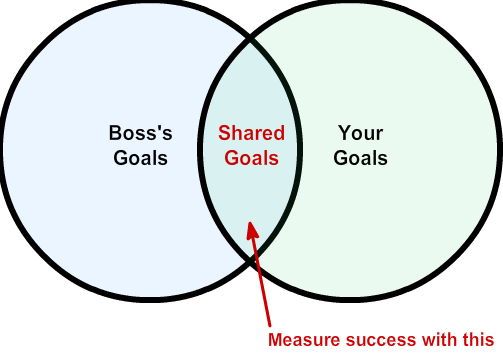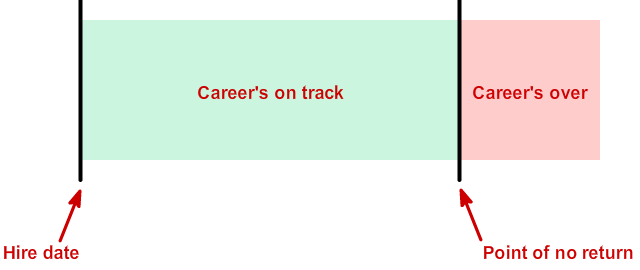- Bob’s Career is Effectively Over…
- The End of a Career is Tough to Predict…
- Red Flag #1: Believing Mastery is Transferrable
- Red Flag #2: Ignoring the Success Half-life
- Red Flag #3: Measuring Success the Wrong Way
- Red Flag #4: Using Idealism to Resist Change
- Red Flag #5: Dysfunctional Burnout
- Red Flag #6: The Knowledge Echo Chamber
- Did You Catch the Secret to Avoiding These Red Flags?
- These Red Flags Don’t Have to Be Your End
- Frequently Asked Questions (FAQs) About Career Red Flags

Bob is the best developer at work.
His code is pristine. It’s well written, and done quickly — he’s incredibly consistent. He’s a model employee, routinely praised by HR as “the best developer in the building.” He’s quiet and unassuming, described as “someone you wouldn’t look at twice in an elevator.”
And he’s about to be fired.
His employers were hacked, or at least that’s what they thought. They saw an incredibly large amount of network activity from China. Fearing the worst, they contacted Verizon to investigate.
What they found stopped them in their tracks.
Bob, a senior developer making six figures, was outsourcing his work. Bob wasn’t particularly interested in working. So he decided to pay developers in China $50,000 to do his job for him, spending the rest of the day on Reddit, eBay and YouTube.
At the end of his workday he’d send out an “end of day update” to management, then go home.
Bob’s Career is Effectively Over…
As it should be. He was exposed via the invoices for his Chinese subcontractors and his web history. His habits created serious red flags so, naturally, he was fired for his deception.
Most developers won’t make the same mistakes Bob did. Most developers are hardworking professionals who take great pride in their work. That’s the good news: there’s still a level of respect that developers have for themselves and those around them.
The bad news? Many developers are still making serious mistakes.
These mistakes create red flags; the kind of red flags that tell your employer, your co-workers, that your career is over. These mistakes aren’t instant career enders. They create disaster slowly. Ignore these red flags long enough and they’ll end your career.
The End of a Career is Tough to Predict…
Because the end can come at any time; I’m not talking about the serious mistakes that can get you fired. I’m not talking about layoffs, insider politics or the circumstances that are out of your control.
I’m talking about the mistakes that slowly destroy your career.
The mistakes I’m talking about are built on the back of all the good things you’ve done. You do something great and it goes bad; you create something positive then it’s poisoned.
The frustrating part about each of these red flags is the fact that they’re unexpected, they live in our blind spots.
What’s worse, the end of your career can be triggered by different things.
- A better employee comes along. If you’re making mistakes and an all-star employee offers to fix problems you’ve created, you’ve triggered a career ender.
- You make a bigger mistake. A mistake that leads people down a path of destruction and loss. When people lose money, influence, friends, security, etc. they hold someone responsible. Make the right mistakes and that person is you.
- People stop caring. Make mistakes and people give you a pass, at first. Keep making them and they get angry. Make them long enough and you create apathy. People tell themselves “I’m done, I’m moving on.”
These aren’t the only triggers. What’s worse, a combination of these triggers and red flags actually accelerates the end of your career.
Which red flags am I talking about?
Red Flag #1: Believing Mastery is Transferrable
Celebrities are famous for a reason. They’re able to find success doing what they do best. The best ones are exceptional — they’re able to command the success, respect and financial rewards they want. But almost inevitably, they start believing their own hype.
They believe mastery in one area is transferrable to another.
How do I know?
They tell us. David Hasslehoff started a fashion line, which failed in less than a year.

So did Lindsay Lohan, Lil Wayne, Miley Cyrus — you get the point.
These celebrities weren’t willing to pay the price of success. But here’s the thing. Developers struggle with this problem too.
“That’s ridiculous, Andrew.”
Is it?
How many times have you seen a brilliant developer who’s skilled in one language (e.g. Python) decide they’re going to learn a new one? Then, after a month or two of work, the very same developer believes they’re suddenly a master of their new language?
Here’s the truth.
Mastery is not transferrable.
You can reduce the learning curve dramatically. You can learn anything quickly, moving yourself to the top 10 list in many industries. But competence isn’t the same thing as mastery and mastery is not transferrable.
Making this assumption leads believers to take unnecessary risks.
- Believing that your skill with one IDE will automatically transfer to another
- Demanding that your team take on something new, expensive or unfamiliar, simply because you feel it’ll be easy
- Telling your boss or a client you can do the job because you’ve done something “similar” in the past
- Recommending Nginx because you’re familiar with Apache and, “how hard can it be?”
Remember those triggers I mentioned earlier? Yeah… Make enough of those mistakes, push the right triggers and your career is over.
Red Flag #2: Ignoring the Success Half-life
Success has a shelf life.
Contrary to popular belief, success doesn’t last forever. People forget, lose interest, stop believing. But why?
Doing great work creates conflict. Remember how I said these problems hide in your blind spots? This is what I’m talking about. When you do anything good, anything at all that’s helpful, positive, good, supportive, etc. It creates a conflict.
Here’s why.
Receivers depreciate, Givers appreciate.
When people give something to others, the value of their gift goes up. Not in reality, of course but in their heads. When you hear people say:
“I gave you X, and this is how you repay me?”
or
“Look at all I did for you!”
You know you’re dealing with appreciation. The value of their gift or good deed has gone up. They expect you to be grateful. No, more than grateful. They expect you to be indebted to them. To sing their praises, and offer recognition for their gift.
Receivers, on the other hand, move in the opposite direction. The value of the gift they’ve received from you goes down. If they feel indebted to you, it’s common for people to have a desire to reciprocate, to satisfy their debt. If the debt is too high they may become resentful, bitter or angry.
Do something good and the countdown starts.
Developers, by definition, are givers. If you’re good at your job you’re a giver. That makes your – boss, manager, employer – a receiver. In the near future, they’re going to forget about what you did.
Here’s the problem.
If you’re not aware of success half-life, you’re going to feel hurt when your awesome work is forgotten. This also means your boss is far more likely to forget your work. Coast on your past success and you’re both headed to an unhappy place where you feel unappreciated and unrewarded, and your boss feels neglected, believing you’re an entitled jerk.
See how this blind spot ruins careers?
Red Flag #3: Measuring Success the Wrong Way
Are you successful at your job? Some developers respond with an enthusiastic Yes! And there’s the problem. What would your boss say? Would he agree with your assessment? Or, would he feel that you weren’t working hard enough?
This is how the disagreement starts.
You know you’ve done an amazing job. You can list all of the things you’ve accomplished. As far as employees go, you’re successful.
Does your boss know that?
What were they looking for when they hired you? Did they outline the business or political reason behind their decisions to bring you on?
No?
If you haven’t accomplished the goal they had in mind are you successful? See the problem?
The way you define success isn’t necessarily the way your boss would define it. Here’s the reality of things:

Your boss, manager, client – has high level goals of their own. You have your own goals. Both of you use your goals to measure success, but, if you’re like most people, neither of you share these details with the other.
Do that long enough and eventually, your career will come to an end.
Red Flag #4: Using Idealism to Resist Change
These developers are idealists who believe things should be done a certain way. They push for what they consider to be the ideal. When these developers get what they want they’re at peace. Life is as it should be.
When it’s not, they struggle to cope. If they’re ultimately unable to cope, they protest, complain and suffer. They don’t mean to but they spread their misery and frustration to others around them.
This usually happens in one of two ways:
- Traditionalism. If you’re dealing with someone like this you’ll typically hear things like “At my old job we did it this way” or “I learned to do things this way.”
- Utopianism. These developers talk about the way things should be, ought to be. They leave you with the sense they’re unhappy with the way things are.
Developers who aren’t aware of their traditional and utopian blind spots often feel frustrated. Why can’t people see what’s wrong here? Is everyone crazy? Things go off the rails when they begin fighting or using force to get what they want from others.
These developers feel justified forcing others into their ideal. It’s a disaster because it kills morale and angers those in charge; this behavior alienates those around them. Then, when they’re out of allies, they reach the end of their career.
Red Flag #5: Dysfunctional Burnout
Like it or not, we all have dysfunctions. Many of us struggle to communicate properly. Some use their ego to strangle their careers. Others struggle with gossip or manipulation. A few of us fight against procrastination and failing to be reliable.
If you’re human you’re probably not living up to your own standards.
As bad as these dysfunctions are, they aren’t the problem. The problem is what you’re doing about it. This is the part where we divide ourselves into three separate camps.
- Disinterest. Developers in this camp deny, argue and attack. They do everything they can to avoid dealing with the problems that make their professional life hard for those around them. They do whatever it takes to justify their dysfunctional and often toxic behavior.
- Excuses. These developers refuse to own their struggles and mistakes. It’s always someone else’s fault. Someone or something got in the way. This thinking traps them in a destructive cycle, pushing co-workers and allies away.
- Growth. These developers realize there’s always work to do. They’re always looking to learn and grow. They realize how little they know so they’re always looking to learn more. They do what they can to continue growing personally and professionally.
Relationships are like bank accounts. Healthy behavior, doing good things, treating others with kindness, behaving the way we’re supposed to puts more into our bank account. Dysfunctional behavior makes withdrawals out of your account.
When your relationship bank account is empty people stop caring. When your account is overdrawn, your career ends as people push you out of their life.
Red Flag #6: The Knowledge Echo Chamber
Being great at what you do can be a disaster. It’s especially dangerous when your co-workers heap praise and attention on you. If you don’t have a plan to deal with what comes afterwards it’s easy to believe your own hype.
It’s incredibly easy to do.
Let’s say you’re viewed as an all-star at work. You’ve achieved a high skill level and suddenly, the things that worked for you in the past are viewed as “the best way” to get things done.
And just like that you’re caught in an echo chamber.
When that happens you stop learning. Your career begins to die as you seek to validate and reinforce what you already know. When you’re stuck in an echo chamber you focus on the wrong things — proving others wrong, showing how smart you are, etc.
Which ends in disaster.
Want to avoid the same career ending mistakes? It’s simple. Permanently assume the role of student. For the rest of your life, learn from everyone and everything.
Learn from the…
- Developer that outperforms you
- Debugger who catches more bugs than you
- Noobs who think in a completely different way than you
- Veterans and senior developers who survived the last down cycle
Learn about your job, the people around you and your boss. Learn from your friends, your enemies and those who don’t care. When you permanently assume the role of student, you avoid the echo chamber. You’ll automatically seek out new information that challenges your worldview, creating an environment that encourages growth.
Did You Catch the Secret to Avoiding These Red Flags?
It’s you.
The more time you spend on your personal and professional growth — character building, professional skills, emotional health, state of mind — the further you are from these red flags. When you focus your time and attention on becoming a better you, you protect yourself from these deadly mistakes.
I know, what a cliché.
But it’s true. It’s also something most developers I’ve met ignore. That’s ironic because the very same developers who feel they “know best” are revealing to the world that they’re already infected with these problems.
These issues aren’t the end of your career.
“I’ve made these mistakes, I’m still making these mistakes and I’m fine.” That’s the objection that’s usually trotted out. Make this assumption and you’re in danger.
These mistakes operate on a continuum.

When you make these mistakes you’re not ruined. Your career isn’t immediately wiped out. There’s a reason for that. You haven’t hit the point of no return.
Yet.
Keep going and things get dicey. At some point people will decide they’re done. That they’re unwilling to put up with anymore. They won’t go any further. They’ll spread the word, blacklisting you. Once that happens…
Your career is over.
These Red Flags Don’t Have to Be Your End
Bob was a fraud, and his career is effectively over. You wouldn’t be foolish enough to make his mistake. How do I know that? You’ve read this article to the end.
You care about your future.
Most developers won’t make the same mistakes Bob did. Most developers are hardworking professionals who do their best every day. That said, a career ending mistake is inevitable if these red flags are hiding in your blind spots.
Wouldn’t it be great to have a career on your terms, where things kept getting better? It’s yours, if you consistently clear out your blind spots. Do that and you’ll find…
Your best days are ahead.
Frequently Asked Questions (FAQs) About Career Red Flags
What are some common signs that my career is stagnating?
Stagnation in a career can manifest in various ways. You may notice a lack of progression or promotion opportunities, despite your consistent efforts and performance. You may also feel unchallenged or bored with your current role, indicating that you’re not growing or learning new skills. Additionally, if you’re consistently overlooked for important projects or roles, it could be a sign that your career is not advancing.
How can I address a mid-career crisis?
A mid-career crisis can be a challenging phase, but it’s not insurmountable. Start by identifying the root cause of your dissatisfaction. Is it the lack of growth, unfulfilling work, or a toxic work environment? Once you’ve identified the issue, consider seeking professional advice from a career coach or mentor. They can provide valuable insights and strategies to navigate your career crisis. Additionally, consider upskilling or reskilling to open up new career opportunities.
How can uncertainty about my career be beneficial?
Uncertainty in your career can be a catalyst for growth and change. It can push you to reassess your career goals, explore new opportunities, and make necessary changes to align your career with your personal and professional aspirations. Uncertainty can also encourage you to step out of your comfort zone and take risks, which can lead to significant career advancements.
What should I do if my career is going nowhere?
If you feel your career is going nowhere, it’s crucial to take proactive steps. Start by setting clear career goals and create a roadmap to achieve them. Consider seeking a mentor or career coach’s guidance to help you navigate your career path. Additionally, upskilling or reskilling can open up new career opportunities. Remember, it’s never too late to make changes and steer your career in the right direction.
How can I leverage online platforms for career advancement?
Online platforms like Indeed.com offer a wealth of resources for career advancement. You can search for jobs, apply directly to companies, and even access resources for resume writing and interview preparation. Additionally, online platforms provide opportunities for networking, which can open up new career opportunities.
How can I identify if I’m in a toxic work environment?
A toxic work environment can significantly impact your career growth and personal well-being. Signs of a toxic workplace may include consistent workplace drama, lack of communication, high turnover rates, and a lack of work-life balance. If you identify these signs, consider seeking professional advice on how to navigate the situation or explore new job opportunities.
How can I ensure continuous growth in my career?
Continuous growth in your career requires proactive efforts. Regularly update your skills and knowledge to stay relevant in your field. Seek feedback from your superiors and colleagues to identify areas for improvement. Set clear career goals and work consistently towards achieving them. Additionally, networking and building strong professional relationships can open up new opportunities for career advancement.
What role does a mentor play in career advancement?
A mentor can play a crucial role in your career advancement. They can provide valuable insights and advice based on their own experiences, help you navigate challenges, and provide feedback to help you improve. A mentor can also help you identify opportunities for growth and advancement in your career.
How can I effectively handle career transitions?
Career transitions can be challenging but are often necessary for growth. Start by identifying your career goals and the skills you need to achieve them. Consider seeking the guidance of a career coach or mentor to help you navigate the transition. Additionally, be open to learning and adapting to new roles and responsibilities.
How can I stay motivated in my career?
Staying motivated in your career requires a clear vision of your career goals and a plan to achieve them. Regularly assess your progress and celebrate your achievements, no matter how small. Seek feedback and use it as a tool for improvement. Additionally, maintaining a healthy work-life balance can help prevent burnout and keep you motivated.
 Andrew McDermott
Andrew McDermottAndrew McDermott is the co-founder of HooktoWin and the co-author of Hook: Why Websites Fail to Make Money. He shows developers and designers how to attract and win new customers.





